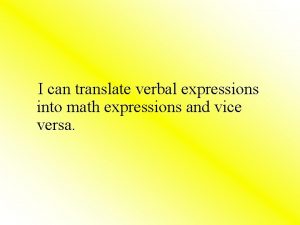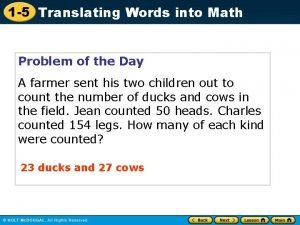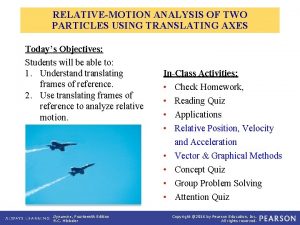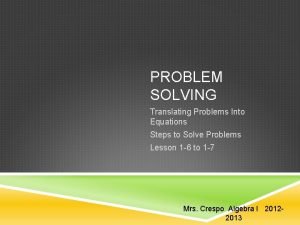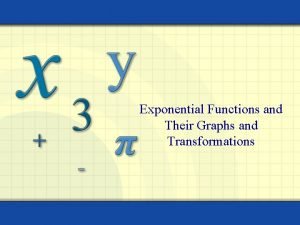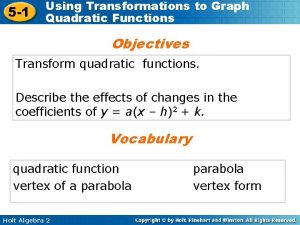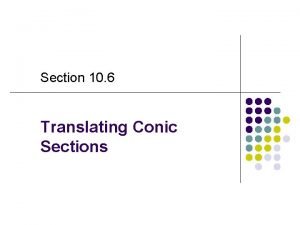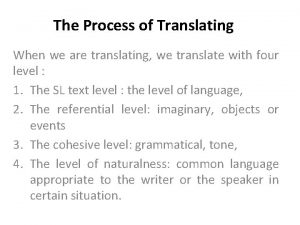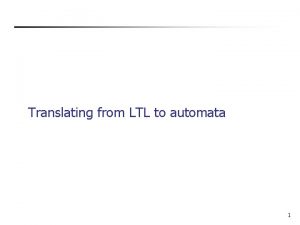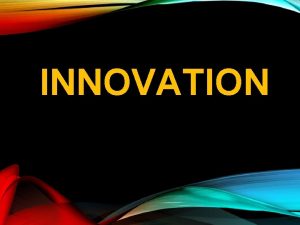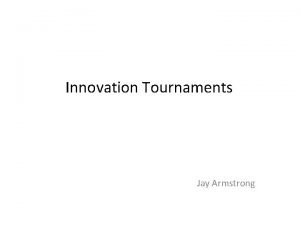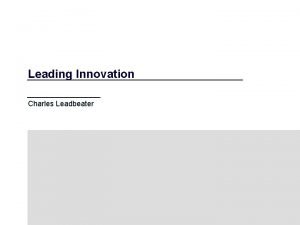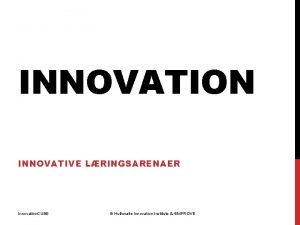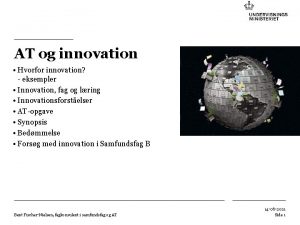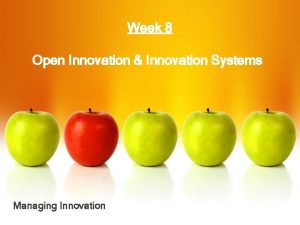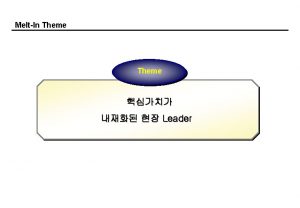WHAT IS INNOVATION The process of translating an



























![STEM Science, Technology, Engineering and Math: Education for Global Leadership "[Science] is more than STEM Science, Technology, Engineering and Math: Education for Global Leadership "[Science] is more than](https://slidetodoc.com/presentation_image_h/75321b212e7b60796764402b56d79af5/image-28.jpg)


- Slides: 30



WHAT IS INNOVATION?

The process of translating an idea or invention into a good or service that creates value or for which customers will pay. To be called an innovation, an idea must be replicable at an economical cost and must satisfy a specific need.

INTRODUCTION • Everyone tend to think they know what is innovation but they truly they just have a vague understanding towards it. Every business leader agrees that it is important. But nobody can quite seem to agree on what it actually is or what it means. • If you ask Google for an innovation definition, it is less than helpful, coming up with over 300 million results with thousands of definitions. Its own definition is pretty much useless: “the action or process of innovating”. Using the traditional sources for a definition such as the Oxford dictionary also doesn’t help much, with their answer being “Make changes in something established, especially by introducing new methods, ideas, or products”

SUSTAINABLE INNOVATION Sustainable innovation has been defined as covering the spectrum of levels of innovation from incremental to radical. Whilst there are no absolute or quantifiable definitions and boundaries, four main levels of innovation can be defined in the context of environmental improvement:

Innovation involves deliberate application of information, imagination and initiative in deriving greater or different values from resources, and includes all processes by which new ideas are generated and converted into useful products. In business, innovation often results when ideas are applied by the company in order to further satisfy the needs and expectations of the customers

Level 1 (incremental): Incremental or small, progressive improvements to existing products Level 2 (re-design or ‘green limits’): Major re-design of existing products (but limited the level of improvement that is technically feasible). Level 3 (functional or ‘product alternatives’): New product or service concepts to satisfy the same functional need e. g. teleconferencing as an alternative to travel Level 4 (systems): Design for a sustainable society

WHAT NEXT • So to have a more clear perspective towards this misunderstood or misinterpreted term we decided to take views of some innovation experts to see how they talk about innovation with their clients and compiled the results obtained by them. We also asked our classmates to give their definition of innovation.

THE QUESTION ASKED TO INNOVATION EXPERTS What is your definition of innovation?

THE OUTCOME • The results surprised us. Even amongst the group of industry insiders here who teach and author books on innovation methodologies, case studies and thought leadership, there was a huge variety between the responses

HERE ARE THE VIEWS OF SOME INNOVATION EXPERTS

Nick Skillicorn

David Burkus • What is your definition of “innovation”: The application of ideas that are novel and useful. Creativity, the ability to generate novel and useful ideas, is the seed of innovation but unless it’s applied and scaled it’s still just an idea.

Stephen Shapiro • What is your definition of “innovation”? Very simply put, innovation is about staying relevant. We are in a time of unprecedented change. As a result, what may have helped an organization be successful in the past could potentially be the cause of their failure in the future. Companies need to adapt and evolve to meet the ever changing needs of their constituents

Pete Foley • What is your definition of “innovation”? I define the innovation process as a great idea, executed brilliantly, and communicated in a way that is both intuitive and fully celebrates the magic of the initial concept. We need all of these parts to succeed. Innovative ideas can be big or small, but breakthrough or disruptive innovation is something that either creates a new category, or changes an existing one dramatically, and obsoletes the existing market leader

Gijs van Wulfen What is your definition of “innovation”? An innovation is a feasible relevant offering such as a product, service, process or experience with a viable business model that is perceived as new and is adopted by customers.

Kevin Mc. Farthing


MY STUDENTS GIVING THEIR DEFINATION OF INNOVATION



1 Ultra private smartphones 2 Agricultural drones 3 Brain mapping 4 Neuromorphic chips 5 Genome editing 6 Micro scale 3 -D painting 7 Mobile collaboration 8 Oculus rift 9 Agile robot 10 Smart wind and solar panel


At times, 17 goals and 169 targets can seem overwhelming (not to mention the 231 indicators to measure the Sustainable Development Goals [SDGs]). But the 2030 Agenda was specifically designed to show the complexity of sustainable development and the interconnectedness of economics, social issues and the environment.

STEPS TAKEN FOR SUSTAINABLE DEVELOPMENT GOALS The global community now widely accepts that an integrated approach is needed to implement the SDGs. The concept has proven more difficult to achieve in practice, however. We frequently hear terms like “silo breaking, ” “policy coherence, ” “indivisibility, ” “nexus thinking” and “whole of government approaches

IMPORTANT STEPS BEING TAKEN WORLDWIDE • We think some of the most important steps taken worldwide for making a mathematically and scientifically for the betterment of our future are STEM (science, technology, engineering and mathematics) and SDG(Sustainable development goals).
![STEM Science Technology Engineering and Math Education for Global Leadership Science is more than STEM Science, Technology, Engineering and Math: Education for Global Leadership "[Science] is more than](https://slidetodoc.com/presentation_image_h/75321b212e7b60796764402b56d79af5/image-28.jpg)
STEM Science, Technology, Engineering and Math: Education for Global Leadership "[Science] is more than a school subject, or the periodic table, or the properties of waves. It is an approach to the world, a critical way to understand explore and engage with the world, and then have the capacity to change that world. . . " — President Barack Obama, March 23, 2015

SDGs • The Sustainable Development Goals (SDGs), otherwise known as the Global Goals, are a universal call to action to end poverty, protect the planet and ensure that all people enjoy peace and prosperity. • These 17 Goals build on the successes of the Millennium Development Goals, while including new areas such as climate change, economic inequality, innovation, sustainable consumption, peace and justice, among other priorities. The goals are interconnected – often the key to success on one will involve tackling issues more commonly associated with another.

MADE AND COMPILED BY SHIVANSH TALLA AND VEDHAS PURII
 Mysite.socccd
Mysite.socccd Incremental innovation vs disruptive innovation
Incremental innovation vs disruptive innovation Quadratic transformations quiz
Quadratic transformations quiz Translating strategy into action
Translating strategy into action Translating expressions and equations
Translating expressions and equations Translating linear inequalities
Translating linear inequalities Translate algebraic expressions
Translate algebraic expressions Translating a sentence into a one step equation
Translating a sentence into a one step equation Translating word problems
Translating word problems Sentence reverser
Sentence reverser 1/8 y as a verbal expression
1/8 y as a verbal expression Translating graphs worksheet
Translating graphs worksheet 1-5 translating sentences into equations
1-5 translating sentences into equations Transformation linear function
Transformation linear function Relative motion of two particles using translating axes
Relative motion of two particles using translating axes The gym is 21 years newer than the auditorium
The gym is 21 years newer than the auditorium Schleiermacher on the different methods of translating
Schleiermacher on the different methods of translating Translating phrases
Translating phrases Translating quadratic functions
Translating quadratic functions Translating english into logical expressions
Translating english into logical expressions Clamshell doors reverse thrust
Clamshell doors reverse thrust Translate
Translate Exponential function transformation
Exponential function transformation Translating research findings to clinical nursing practice
Translating research findings to clinical nursing practice Translation of financial statements
Translation of financial statements Translating between tables and expressions
Translating between tables and expressions Translating contracts
Translating contracts Translate
Translate Translating quadratic functions
Translating quadratic functions Translating chemical equations
Translating chemical equations Translating conic sections
Translating conic sections










